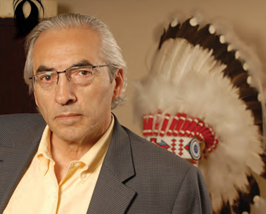 Lethbridge College is set to welcome Phil Fontaine, former National Chief of the Assembly of First Nations, to its campus for its aboriginal graduation dinner.
Lethbridge College is set to welcome Phil Fontaine, former National Chief of the Assembly of First Nations, to its campus for its aboriginal graduation dinner.
Tracy Edwards, president of Lethbridge College, says Fontaine’s visit is an honour for the college that will underscore the institution’s dedication to its students of aboriginal descent.
“We are very aware Lethbridge College is located in traditional Blackfoot territory and we have long recognized the significance of that location,” says Edwards. “Our mandate is to serve all of southern Alberta, and we are proud of our First Nations learners, many of whom will be receiving their diplomas at convocation.”
Fontaine was an advocate for Aboriginal rights long before his election as chief of the Assembly of First Nations, a position he held for three terms (1997-2000 and 2003-09).
He was appointed special advisor to RBC last September to provide advice and counsel to RBC's Canadian businesses to help the company deepen its relationships with Aboriginal governments, communities and businesses in Canada.
Fontaine was born on the Sagkeeng First Nation in Manitoba in 1944. He was elected its chief at 28 and still plays an active role in the community. The youngest son in an Ojibway family of 12 children, Fontaine lost his father when he was six. His mother, Agnes, persevered, and although the home lacked electricity and running water,
Fontaine remembers it as a place of happiness and love.
That was before he was sent by the government of Canada to the Fort Alexander Indian Residential School, where he experienced racism, sexual and physical abuse. Following his time in the residential school system, he developed an interest in politics, following his mother, the first woman elected to a band council in Canada.
Fontaine was elected as Manitoba regional chief for the AFN, then, in 1991, as grand chief of the Assembly of Manitoba Chiefs for three consecutive terms. He was instrumental in the defeat of the Meech Lake Accord, which would have given special status to Quebec but not to the First Peoples of Canada.
In 2009, Fontaine met with Pope Benedict XVI and won a formal acknowledgement of, and apology for, abuses at church-run government residential schools, one of which he attended as a child, in an effort to aid healing and reconciliation for survivors.
Also last year, Fontaine established Ishkonigan, a consulting and mediation firm that “provides professional management and advisory services to indigenous communities, governments and the private sector.”
Among his many awards are five honorary doctor of laws degrees from Canadian universities.


